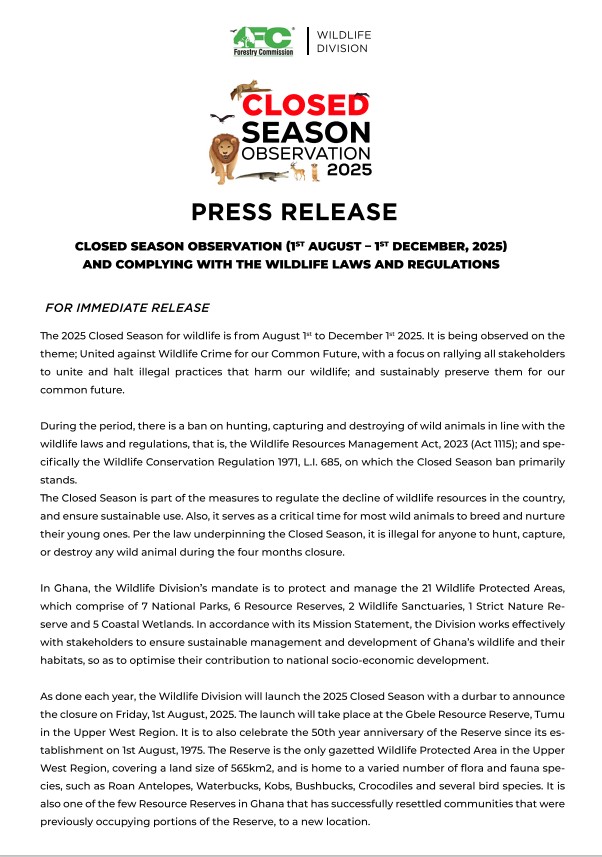
From August 1st to December 1st, 2025, Ghana will observe its annual Closed Season for wildlife, under the theme: United Against Wildlife Crime for Our Common Future.
The four-month nationwide ban prohibits hunting, capturing, or destroying wild animals, as mandated by the Wildlife Resources Management Act, 2023 (Act 1115) and the Wildlife Conservation Regulation, 1971 (L.I. 685).
This vital conservation measure aims to curb the rapid decline of Ghana’s wildlife populations, protect endangered species, and allow them to breed and nurture their young without disturbance. Beyond preserving biodiversity, it supports climate resilience and safeguards cultural heritage tied to Ghana’s natural ecosystems.
The Wildlife Division of the Forestry Commission, which manages 21 protected areas across the country, will formally launch the 2025 Closed Season with a grand durbar at the Gbele Resource Reserve in Tumu, Upper West Region, on Friday, August 1st, 2025. This year’s event coincides with the 50th anniversary of the Reserve’s establishment in 1975. Covering 565 km², Gbele is home to Roan Antelopes, Waterbucks, Bushbucks, Crocodiles, and diverse birdlife, and stands as the only gazetted wildlife reserve in the region.
During the Closed Season:
- It is illegal to hunt, capture, trade, or export any wildlife or related products, including the popular grasscutter (akrantie)—without valid permits.
- All restaurants, chop bars, traders, and wildlife businesses must ensure they hold official licences for existing stock, obtained before the season began.
- Products or animals found without proof of legal acquisition will be confiscated.
- Violators face penalties: fines of 250–500 penalty units and/or imprisonment of 12–24 months.
The Wildlife Division will conduct monitoring and nationwide sensitisation campaigns, highlighting the dangers of poaching, bushfires, illegal mining, and unregulated farming, all major threats driving species towards extinction. These threats not only endanger wildlife but also disrupt ecosystems, harm cultural traditions tied to wildlife, and worsen climate challenges such as drought, flooding, and soil infertility.
Ghanaians are urged to comply fully, remain vigilant, and unite to protect these shared natural treasures—not just for today, but for generations to come.
Together, we can halt wildlife crime and build a future where nature and people thrive side by side.
For more information or to regularise existing wildlife stock, contact the nearest Wildlife Division office.
By Peter Quao Adattor










